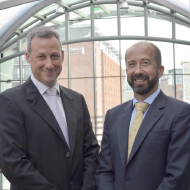
The ceremony took place during the association’s annual congress.
Equine medicine and therapeutics consultant Dr David Rendle has been appointed as president of the British Equine Veterinary Association (BEVA) for 2022/23.
Dr Rendle took over the reins from Huw Griffiths during the Association’s annual congress in Liverpool (7-10 September). He will be supported by the new president-elect, Roger Smith.
David said that he will use his presidential year to build on his recent work around antimicrobial and anthelmintic resistance as well as expanding BEVA’s global outreach to support more equine vets and have a greater impact on equine welfare.
He said: “I’ve had a great time being part of the profession for the past 20 years and I am now in a position to give something back. Huw has driven much activity in the past year around recruitment and retention and I hope to be able to build on this and action results from the recent survey, under Huw’s continued supervision.
"I am also determined to maintain momentum around BEVA’s antimicrobial and anthelmintic resistance work as well as step up collaboration internationally on these and other projects to extend BEVA’s global outreach ".
A graduate of the University of Bristol, David has extensive experience in farm animal and equine practice.
He trained as a specialist in equine internal medicine, earned a masters via research on equine asthma, and achieved an RCVS certificate in equine medicine during a three-year Horserace Betting Levy Board residency at The University of Glasgow and Liphook Equine Hospital.
Dr Rendle spent time at The Royal Veterinary College, London, and Charles Sturt University in Australia before moving to Rainbow Equine Hospital in Yorkshire, where he led the internal medicine and laboratory services as a director and subsequently a clinical director.
He now combines work as an independent equine medicine and therapeutics consultant with running the family farm on the edge of Exmoor. He is chair of BEVA’s health and medicines committee.
David added: “Around 99 per cent of the world’s horses are cared for by around one per cent of the world’s vets so we are not going to change things overnight; however, BEVA has so much to offer and we should use our resources to support equine welfare, irrespective of where equine vets and their patients live and work".
Image (C) BEVA.



 The RCVS has announced a new version of its 1CPD mobile app, with enhanced features for veterinary surgeons and veterinary nurses to record their continuing professional development.
The RCVS has announced a new version of its 1CPD mobile app, with enhanced features for veterinary surgeons and veterinary nurses to record their continuing professional development.